Africa is not what you think

The necessity, with the utmost urgency and priority, of a guided change in European mindsets through a large awareness-raising campaign for everyone.
Town-hall debates organized by the Ministers of Foreign Affairs.
Belgium as a pilot country: 100 town-hall debates
Europe must 'deserve' a partnership with Africa - Europe needs Africa more than the other way around.
Expected results "Africa is not what you think" (Belgium, pilot country)
- A critical mass of 75 Belgian Industrial SMEs are actively seeking win-win (and balanced) partnerships with established African counterparts (not startups, not nano-enterprises). The Belgian partner brings expertise in complex industrial value chains and advanced technologies. The African partner contributes with commercial know-how, market knowledge, land rights, understanding of local administrations and customs, as well as expertise in the installation and maintenance of advanced products in their usual economic sector. African partners market, install, and maintain innovative or competitive products and services that enhance the productivity and competitiveness of African industries that locally transform African raw materials into exportable products (examples: 'Woodworking machines', Tool manufacturing for construction, agriculture and industry (shovels, spades, trowels, picks, ...).
- In the long term, they jointly invent new products specifically intended for the AFCFTA (the largest free trade market in the world) based on advanced technologies and industrial processes, as well as knowledge of the African market, and they are manufactured locally in Africa.
- Serendipity. Often, such a partnership between entrepreneurs from different cultures and continents accidentally discovers new products and services that are truly promising but not sought after. Innovative products that are desired not only in Africa but also in Europe and ... everywhere in the world.
Remarks
- The financing of the 75 'proven' PMI partnerships Africa-Europe. In this type of partnership, each 'established' entrepreneur brings their existing material investments and intangible skills, requiring little to no additional funding, except for an initial investment in a plane ticket to meet and visit the infrastructures, consult the skills and clientele of each partner. Essentially, it's about looking each other in the eye and assessing whether there is a way to achieve a sustainable win-win partnership. Such an assessment of the chances of success must be carried out by the potential partners themselves, possibly supported by the business federations of both continents, not by a consulting firm.
- Campaigns to change mindsets « Africa is not what you think_" led by the Minister of Foreign Affairs and supported by regional business federations. Or "Focus on Africa, the largest growth market in the world | De Tijd (Opinion by the CEOs of VOKA and UNIZO in "De Tijd" on 16/9/2024). "Economic powers like China are investing heavily in Afrika. If we do nothing, they will ruthlessly push our companies out of the market. Our new African strategy must focus on win-win partnerships between Belgian and African companies, generate collaborations in energy transition, and explore the potential of circular migration of highly qualified individuals. Once the strategy is established, an awareness campaign for businesses can take place. The Flemish employer organizations commit to supporting this initiative."
- Are there examples of successful campaigns to change public mindsets on the theme 'Africa is not what you think'? No, it has not been tested anywhere in Europe. It should be noted that the recommended mindset change activity 'Whole-of-society' does not require additional investments: in Belgium, the ODA ENABEL reallocates its priorities for a year, freeing up ten of its 2,000 budgeted employees to organize 100 debate evenings. About a hundred cities and municipalities generously make their cultural centers or event halls available for this public interest activity. So why not test such a campaign?
- Awareness campaigns in Africa. The African economy being dominated by extractive industries and the informal sector, few entrepreneurs are familiar with the complexity of international industrial value chains. It is recommended that Europe funds a small team of five young master's graduates in business management in each African country for one year, to study the industrial value chains of emerging countries and adapt them to the African reality. Subsequently, the governments of African countries ask them to organize about thirty public debate evenings for both the general public and entrepreneurs across the country, on the theme 'Why participate in international industrial partnerships/value chains and how to achieve win-win and balanced outcomes'. Expected results: In every African country, hundreds of entrepreneurs - from all economic sectors - are searching online for partnerships with international counterparts. They quickly transfer advanced technologies and processes at scale and low cost. They learn from mistakes and stimulate serendipity (accidentally finding truly promising new products and services).
- What about the other ODA programs and official economic missions?
- Thirty years and thousands of Western cooperation programs, along with hundreds of economic missions, have failed to prevent the widening gap of well-being between African and European citizens. Moreover, European exports to Africa, due to the lack of purchasing power of a significant middle class, have decreased over the past five years.
- Africa is calling for a massive and priority transfer of sophisticated industrial processes and technologies. A critical mass of one thousand partnerships between SMEs in Africa and Europe, followed by a few dozen foreign direct investments, will initiate Africa's industrial modernization, creating twenty million decent jobs each year alongside substantial purchasing power for European products and services.
- Why not start with five well-selected and well-supported partnerships? (Their success will create a ripple effect and encourage others to do the same). This has been tested several times without visible results due to a lack of critical mass of successes capable of motivating other SMEs to follow their example. This strategy, unfortunately without tangible results, is generally recommended by consulting firms seeking short-term billable revenues.
- Why seek partnerships with Africa? At a time of a stagnant or retreating European market, with a hyperkinetic and incoherent American partner, and where everyone is already present in China, the President of the European Commission is looking to forge economic and geostrategic partnerships with South America and India.
- Why not prioritize partnerships with our neighboring Africa, which in twenty years will hold 25% of the world's population, 60% of the world's renewable energy, 35% of the global potential for green hydrogen production at €2/kg, 60% of the world's arable land, and abundant climate-strategic raw materials? A continent, moreover, in close physical and cultural proximity.
- The development of South Korea compared to the development of Africa. Well before the Korean War of the 1950s, there was already a manufacturing tradition led by large industrial families (the 'chaebols'), particularly in the shipbuilding sector, which, after the war, like in Germany and Japan, quickly resumed and expanded their manufacturing activities, inspired, encouraged, assisted, and/or forced by American direct investors and competitors. Africa, on the other hand, continues to suffer from the curse of its natural wealth. Just as during the colonial era, the rest of the world continues to see Africa as a warehouse of raw materials to be processed at home. Africa's reliance on its low-employment extractive industry is the source of the growing asymmetry of its well-being compared to the rest of the world. Africa produces very few exportable goods.
- A completely autonomous developing Africa without international partnerships? No country or continent has ever succeeded in developing in autarky. Companies or regions specialize in certain niches of the economy, manage to conquer international markets, and generate revenues to pay for goods and services not produced locally. Certainly, in the current era of a definitively globalized economy and hyper-complex industrial value chains, it is impossible for Africa to autonomously master the know-how required to orchestrate value chains. This cannot be learned at university or in business incubators. It is only in the field, through the practice of proven partnerships, as a link in a value chain or as a manager in a multinational, that one can internalize the necessary skills to potentially orchestrate an industrial value chain oneself.
- What about the endemic scourges of Africa? (corruption, inequalities, gender imbalance, child labor, nepotism, lack of land rights, regime instability, ...). Today's West, which promotes the SDGs in Africa, forgets that during the time of a non-industrialized West or at the beginning of its industrialization, the West suffered from many ills similar to those that Africa suffers from today. It was not until 1948 that universal suffrage for women was introduced in Belgium. Germany experienced "Kartoffel-Urlaub" (child labor during potato harvest) until the end of the last century. It was only when industrialization in Europe reached a certain level of maturity that a counter-power characterized by a vocal middle class, strengthened by workers' unions, some priests, and visionary entrepreneurs, succeeded in claiming "the eight-hour workday," "the five-day workweek." “les congés payés“, “la prévoyance sociale“, ... "Paid holiday leave," "social security," ... Conclusion: a "social" West must promote the acceleration of modern industrialization in Africa in order to achieve the SDGs, put an end to corruption, nepotism, instability, create a general purchasing power to stimulate European exports to Africa, and prevent illegal migration. It should be noted that the handicap of land rights and administrative instability does not apply within the framework of win-win partnerships between established African and international SMEs. The African partner provides "its" infrastructure for the partnership. Even fragile countries like the DRC have significant "stable" regions characterized by SMEs with street-facing businesses.
- The modern industrialization of ten sub-Saharan countries with relatively stable institutions is benefiting all of Africa. The success of the 'ten stable' is quickly followed by their fragile neighbors.
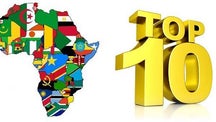
- Les décideurs politiques et la société civile d'une dizaine de pays subsahariens dotés d'institutions assez stables (*) estiment que la transformation locale des ressources premières en produits compétitifs crée notamment plus d'emplois par an que la croissance démographique. C'est le seul moyen d’endiguer la pauvreté et de créer une classe moyenne habilitée qui supprime les inégalités de l’intérieur. Ces ‘dix stables’ peuvent déjà compter sur de nombreux jeunes ingénieurs et économistes hautement qualifiés, sur des sites industriels accessibles, sur des sources d'énergie renouvelables localement disponibles et sur la connectivité Internet, sur des terres agricoles ‘du monde’ et sur leur propre couche supérieure financière.
(*) The Economist Democracy Index 2023 Sub-Saharan Africa (Ranking Feb 15 2024): 1. Mauritius, 2. Botswana, 3. Cabo Verde, 4. South Africa, 5. Namibia, 6. Ghana, 7. Lesotho, 8. Malawi, 9. Zambia, 10. Liberia, 11. Senegal, 12. Tanzania, 13. Madagascar, 14. Kenya, 15. Benin, 16. Uganda, 17. Gambia, 18. Sierra Leone, 19. Nigeria, 20. Côte d’Ivoire, 21. Angola, 22. Mauritania.
- The service sector. No country in the world can survive in autarky. Their citizens wish to acquire products and services that are not manufactured or produced in the country. Only a substrate of exportable industrial products with local added value generates revenue to pay for these foreign products or services. This is why African governments urgently and as a priority request the massive transfer of know-how in industrial processes and advanced technologies to Africa. They wish to add local value to their natural resources. Only the United States succeeds in generating large masses of revenue through the export of services. What is regrettable, however, is that this revenue only benefits a small group of billionaire techno-monopolists.
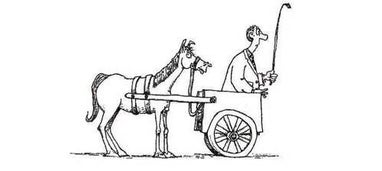
- Le rôle des technologies (la machine à vapeur, le moteur à combustion interne, l'électricité, les TIC, les robots, Internet, l'Intelligence Artificielle, etc.). En effet, toutes ces nouvelles technologies créent de nouveaux secteurs économiques en elles-mêmes, mais elles agissent principalement comme un facteur habilitant pour l'augmentation et l'accélération de la production de produits et services innovants, actuellement surtout des produits plus respectueux du climat et plus recyclables. En l'absence d'incitations massives au transfert de savoir-faire de l'industrialisation agro-alimentaire et manufacturière traditionnelle, les précédents programmes de coopération « Digital 4 Development » n'ont pas réussi à endiguer la pauvreté en Africa. Ils ont mis la charrue avant les bœufs.
- Le rôle de la diplomatie et des expatriés occidentaux en Africa.
- Ces personnes résident en Africa pendant de longues périodes (entre un et huit ans). Cependant, leur champ d'activité est souvent dominé par des contacts avec leurs pairs impliqués dans les mêmes domaines de diplomatie ou de coopération au développement, (les chambres d'écho) au détriment des contacts avec une société civile de plus en plus instruite composée de futurs décideurs et/ou influenceurs, très souvant frustrés (beau diplôme, mais à la recherche d’un emploi décent), ou avec avec des PMI ayant pignon sur rue, ou l'élite financière qui a prospéré dans l'économie informelle.
PS. Le rêve ultime pour nos petits-enfants aussie bien en Europe qu'en Africa
La Communauté Afro-Européenne ‘Mandela-Schuman’ de l’Industrie Energivore.
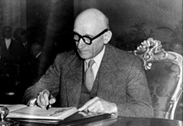
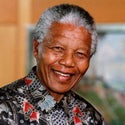
On May 9, 1950, Robert Schuman, the French Minister of Foreign Affairs, succeeded in convincing five European countries to pool their coal and steel (the ECSC declaration 'European Coal and Steel Community'), which gave rise to the EU and 75 years of lasting peace in Europe.
In 1990, in South Africa, Nelson "Madiba" Mandela was released after 27 years of imprisonment.He was not there to take revenge, but immediately negotiated with the government of the time for a black and white future for South Africa.
Today, the ever-growing asymmetry of prosperity between Europe and Africa threatens the security of both continents. The energy-intensive industry is facing huge pressure toward sustainability, and it must become CO2 neutral. Africa has sixty percent of the world's solar energy production capacity and thirty-five percent of the world's green hydrogen production capacity at 2 €/kg.Pooling abundant African green and mineral resources with European expertise in energy-intensive production and zero-emission transport of key raw materials:
(1) saves 30% of CO2 emissions in Africa and Europe; (2) prevents climate disasters; (3) stops illegal immigration from Africa; (4) encourages the modernization of the European industry; (5) makes Europe energy independent; (6) guarantees peace and prosperity for grandchildren in Africa.(1) saves 30% of CO2 emissions in Africa and Europe; (2) prevents climate disasters; (3) stops illegal immigration from Africa; (4) encourages the modernization of the European industry; (5) makes Europe energy independent; (6) guarantees peace and prosperity for grandchildren in Africa and in Europe.
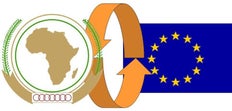


Maak jouw eigen website met JouwWeb